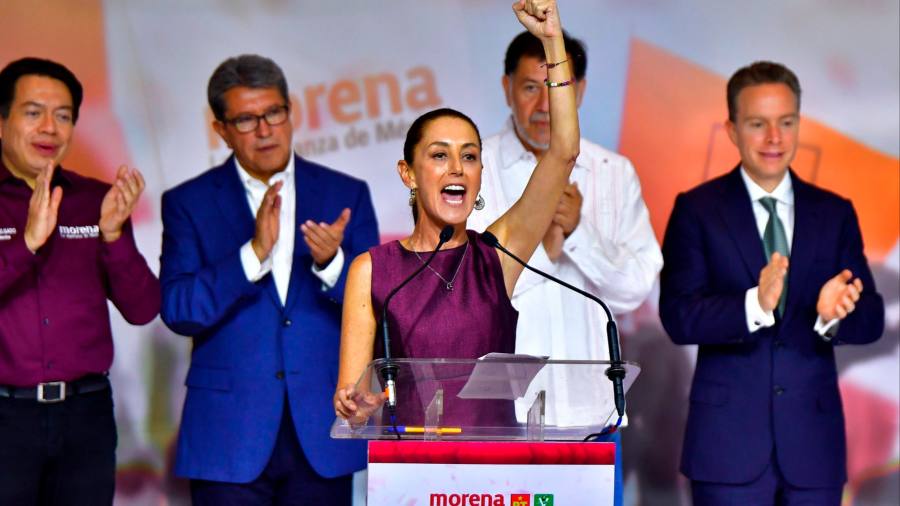Receive free Mexico updates
We’ll send you a myFT Daily Digest email rounding up the latest Mexico news every morning.
A former climate scientist and a self-made businesswoman will contest Mexico’s presidential election next year after the ruling Morena party chose former Mexico City mayor Claudia Sheinbaum as its candidate.
The race between Sheinbaum and Xóchitl Gálvez means Mexico is likely to have a female leader for the first time in its 200-year history after the June 2024 poll.
While the winner will inherit a stable economy with rising wages and record-low poverty, the candidates will strive to show how they can help fully capitalise on investment from companies diversifying away from China.
The next president will also face the question of whether to maintain the policies of outgoing leader Andrés Manuel López Obrador, who empowered the military and state-owned companies, weakened institutions, increased social programmes and dialled up divisive political rhetoric.
Next year will be the first time López Obrador himself is not on the presidential ballot since 2006 but voters will probably be motivated by their view of his policies.
“One represents the continuity of this project, and the other, the critique of this project,” said Martha Bárcena, who was Mexico’s ambassador to Washington until 2021. “It reflects the polarisation of the country.”
After her announcement late on Wednesday as the ruling party’s candidate, Sheinbaum said: “Mexico has changed, today we have a country with less poverty, today we have a country with less inequality.
“There’s no time to lose, we’ll keep working . . . [and] there will be a female president,” she added.
Sheinbaum, 61, a respected climate scientist, defeated former foreign minister Marcelo Ebrard in a nationwide poll in which the latter claimed irregularities, fuelling rumours he might quit Morena.
Her political development came in the capital’s leftwing academic circles, but Sheinbaum’s technocratic background contrasts with the populist López Obrador, who pursued a greater role for the state in the economy.
Her opponent, Gálvez, 60, of the conservative, free-market National Action party (PAN), was born in rural poverty to an indigenous father and built a successful consulting company.
Both candidates studied sciences at the same public university in the 1980s and support welfare benefits and abortion rights. Mexico’s Supreme Court on Wednesday voted unanimously to decriminalise abortion, the latest victory for reproductive rights activists in Latin America.
The campaign will unfold amid an escalating drug war, with dozens of lower-level candidates murdered in the past two election cycles. Once in office, they will have to navigate a lack of fiscal wriggle room as well as try to wrest back control of territory run by organised crime.
“The next president is going to have a much harder time than López Obrador,” said Claudio Lomnitz, a professor at New York’s Columbia University, adding that while Galvez was the more charismatic candidate Sheinbaum would benefit from the Morena political machine.
“I think that whoever gets in there will be a bit hamstrung . . . each side will have to make concessions.”
Under López Obrador, Mexico, whose 1994 free trade agreement with the US and Canada industrialised large parts of the economy, has faced pressure from Washington over trade and drug cartels’ supply of fentanyl, which is now the leading cause of death for young Americans. Some Republicans have proposed military intervention in Mexico against drug traffickers.
In June, Sheinbaum, the granddaughter of Jewish immigrants and one of López Obrador’s closest allies, said Mexico should have a relationship of equals rather than “submission” to the US, the country’s most important commercial and security partner.
“If it’s Xóchitl, my guess is that she would be . . . looking for ways to lever Mexico’s future on a closer and tighter relationship with the US, which probably Claudia would not do,” said Luis Rubio, a political analyst at México Evalúa.
The candidates also have competing visions for attracting investment, with Gálvez accusing the incumbent government of scaring off companies looking to reshore operations closer to the US with unclear rules.
A poll this month by newspaper Reforma showed Sheinbaum leading Gálvez by about 17 points, a margin analysts attributed largely to López Obrador’s own approval ratings of 60 per cent, thanks to social programmes and anti-corruption rhetoric.
The race could also be shaken up by a third candidate, with analysts speculating for months over whether Ebrard will break with Morena to join the smaller Citizens’ Movement party.
Javier Rebollo, 58, from Mexico City’s working-class Iztapalapa district, said he backed Sheinbaum because of her record in the capital and support for López Obrador, hoping for “the continuation of what we’ve been living since 2018”.
Read the full article here




